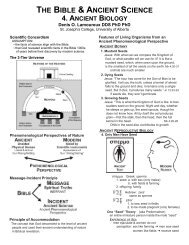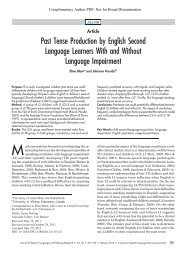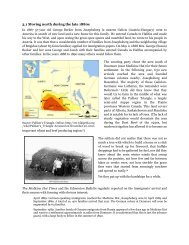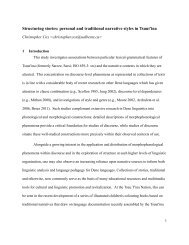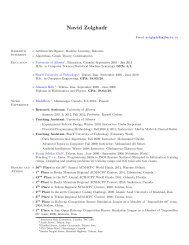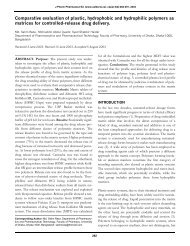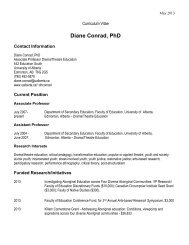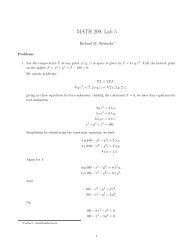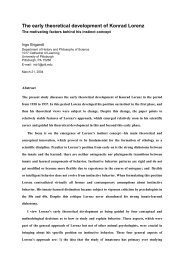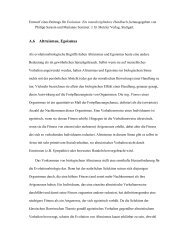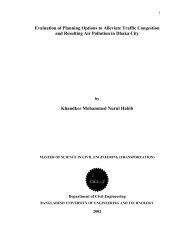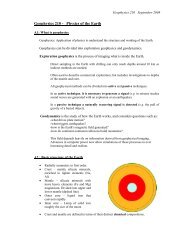presentation - University of Alberta
presentation - University of Alberta
presentation - University of Alberta
Create successful ePaper yourself
Turn your PDF publications into a flip-book with our unique Google optimized e-Paper software.
Viewpoint in Translation: The <br />
role <strong>of</strong> epistemic modal and <br />
evidential markers in a literary <br />
text <br />
Ad Foolen, Radboud <strong>University</strong> <strong>of</strong> Nijmegen <br />
Toshiko Yamaguchi, <strong>University</strong> <strong>of</strong> Malaya
Beauty and Sadness <br />
* Utsukushisa to Kanashimi to <br />
* 美 しさと 哀 しみと <br />
* Yasunari Kawabata (1899-‐1972) <br />
* Nobel laureate in 1968 <br />
* awarded "for his narrative mastery, which with great <br />
sensibility expresses the essence <strong>of</strong> the Japanese mind" <br />
* Published serially in a magazine 婦 人 公 論 in 1961-‐63 <br />
* Committed suicide in April, 1972 <br />
Viewpoint in Translation: Foolen & Yamaguchi <br />
2 <br />
26/6/2013
Story <br />
Beginning<br />
* The protagonist Toshio Oki on the express train <br />
* Heading for Kyoto on 29 Dec <br />
* To listen to the New Year’s Bell without his family <br />
* To meet his former lover Otoko who is living as a <br />
successful painter <br />
* Felt guilty and pain <br />
* Unusualness <br />
* uniqueness <br />
Viewpoint in Translation: Foolen & Yamaguchi <br />
3 <br />
26/6/2013
Narrator’s, reader’s and character’s <br />
positions <br />
WORLD <br />
views <br />
Character <br />
views <br />
Narrator <br />
reads <br />
subjectivity <br />
Reader <br />
intersubjectivity <br />
Intrusive <br />
narrator <br />
Viewpoint in Translation: Foolen & Yamaguchi <br />
4 <br />
26/6/2013
Cognitive linguistic approach to <br />
narratives <br />
* Narratives can be explained through the properties <strong>of</strong> CL <br />
* Subjectivity / intersubjectivity <br />
* Dancygier (2012) <br />
* Narratives have been examined in terms <strong>of</strong> <br />
* Speech-‐Thought-‐Re<strong>presentation</strong> / Leech and Short (1981, Chap. 10) <br />
* 1. How does the narrator present speech? <br />
* Direct Speech <br />
* Indirect Speech <br />
* Free Indirect Speech <br />
* First-‐Person Narration / Third-‐Person Narration <br />
* 2. What thought does the narrator present? <br />
Viewpoint in Translation: Foolen & Yamaguchi <br />
5 <br />
26/6/2013
Intersubjectivity / instrusive narrator <br />
* Narrator speaks to the reader <br />
* Narrator addresses the reader directly <br />
* Narrator manipulates the language <br />
* By using epistemic modal expressions <br />
* motiron ‘Certainly’ <br />
* By creating cohesion <br />
* repetition <strong>of</strong> ‘being one’ in different forms <br />
* By using an evidential marker as an euphemistic marker <br />
Viewpoint in Translation: Foolen & Yamaguchi <br />
6 <br />
26/6/2013
Statements <br />
* Conceptual construct intersubjectvity is present in <br />
the novel and its effects in translations <br />
* Relationship between narrator and reader is achieved <br />
through narrator’s experience/viewpoint with the <br />
situations <br />
* The narrator enters the character’s world <br />
* The narrator speaks to the reader <br />
* Intersubjectivity is supported by incomplete <br />
translations in English and German <br />
Viewpoint in Translation: Foolen & Yamaguchi <br />
7 <br />
26/6/2013
Setting <br />
Viewpoint in Translation: Foolen & Yamaguchi <br />
8 <br />
26/6/2013
Opening (English) <br />
* (1) Five swivel chairs were ranged along the other side <br />
<strong>of</strong> the observation car <strong>of</strong> the Kyoto express. <br />
* (2) Oki Toshio noticed that the one on the end was <br />
quietly revolving with the movement <strong>of</strong> the train. <br />
* (3) He could not take his eyes from it. <br />
* (4) The low armchairs on his side <strong>of</strong> the car did not <br />
swivel. <br />
Viewpoint in Translation: Foolen & Yamaguchi <br />
9 <br />
26/6/2013
Opening (Japanese) <br />
English Translation Closer to the Original Text <br />
* (1) Five swivel chairs were ranged along one side <strong>of</strong> <br />
the observation car <strong>of</strong> the Kyoto express. <br />
* (2) Oki Toshio noticed that only the one at the end <br />
was quietly revolving on its accord. <br />
* (3) He could not take his eyes from it. <br />
* (4) The low armchairs on his side were clearly fixed <br />
and these could not swivel. <br />
Viewpoint in Translation: Foolen & Yamaguchi <br />
10 <br />
are not translated ! <br />
Emphasis on ‘being one’ <br />
26/6/2013
Opening (German) <br />
* (1) Im Aussichtswagen des Expresszuges “Hato” der <br />
Tokaido-‐Linie standen an der einen Fensterseite fünf <br />
Drehsessel in einer Reihe. <br />
* (2) Toshio Oki bemerkte, daß sich der letzte Sessel in <br />
dieser Reihe durch die Bewegungen des Zuges <br />
geräuschlos hin-‐ und herdrehte. <br />
* (3) Er starrte gebannt darauf. <br />
* (4) Die niedrigen Sitze mit Armlehne auf der Seite, wo <br />
er saß, waren fest und unbeweglich. <br />
Viewpoint in Translation: Foolen & Yamaguchi <br />
11 <br />
26/6/2013
The first paragraph <br />
Language <br />
Japanese <br />
English <br />
German <br />
Occurrence <strong>of</strong> subjectivity/<br />
intersubjectivity <br />
7 (slide 10) <br />
2 (slide 9) <br />
3 (slide 11) <br />
Viewpoint in Translation: Foolen & Yamaguchi <br />
12 <br />
26/6/2013
Narrator’s experience <br />
* Link between one chair and one person (objective <br />
description) <br />
* The turning chair is the only one <br />
* The chair is turning on its own <br />
* Oki is sitting alone in the car <br />
* Manipulating a language by linking expressions meaning <br />
‘being one’ <br />
* Drawing/inviting the reader to Oki’s world <br />
(Intersubjective) <br />
Viewpoint in Translation: Foolen & Yamaguchi <br />
13 <br />
26/6/2013
Incomplete translation <br />
* Another piece <strong>of</strong> evidence for the presence <strong>of</strong> <br />
intersubjectivity <br />
* Oki’s mind is translated well <br />
* Expressed overtly <br />
* Narrator’s link to reader is not translated well <br />
* Expressed covertly <br />
* Evidential marker rashii ‘seem’ <br />
* Pure evidential marker -‐ translated <br />
* Euphemistic – not translated <br />
Viewpoint in Translation: Foolen & Yamaguchi <br />
14 <br />
26/6/2013
Rashii ‘seem’ <br />
* Evidential usage is translated <br />
* Probably they were in the dining car. (E) <br />
* Sie waren anscheinend in den Speisewagen gegangen. <br />
(G) <br />
* They seemed tired <strong>of</strong> photograhing … (E) <br />
* … hatten sie die Lust am Fotografieren wohl verloren <br />
…(G) <br />
Viewpoint in Translation: Foolen & Yamaguchi <br />
15 <br />
26/6/2013
Euphemistic/indirect usage <br />
* Euphemistic usage is not translated <br />
* Ima mo hitorimide kurasi-‐teiru-‐rashi-‐katta. <br />
now still alone live-‐aspect-‐seem-‐past <br />
‘She seems still unmarried’ (but Oki knows that Otoko is <br />
unmarried) <br />
* She was still unmarried. (Eng) <br />
* Sie war unverheiratet geblieben. (Ger) <br />
‘She remained unmarried’ <br />
Viewpoint in Translation: Foolen & Yamaguchi <br />
16 <br />
26/6/2013
The Snow Country <br />
* 国 境 の 長 いトンネルを 抜 けると 雪 国 であった。 <br />
English <br />
German <br />
Ikegami <br />
Ours <br />
* The train came out <strong>of</strong> the long tunnel into the snow <br />
country. <br />
* Als der Zug aus dem langen Grenztunnel herauskroch, <br />
lag das Schneeland vor ihm ausgebreitet. <br />
* (I) pass(ed) through (the) long boundary-‐tunnel, and <br />
(I) was in/(there) was (the) snow country. <br />
* When (the train) came out <strong>of</strong> the long boundary-tunnel,<br />
(dear readers!) it reached the snow country! <br />
Viewpoint in Translation: Foolen & Yamaguchi <br />
17 <br />
26/6/2013
* Ikegami (2008) : “I” is <strong>of</strong>f-‐stage <br />
* English and German are objective languages <br />
* The overt presence <strong>of</strong> the train -‐-‐-‐ expression <strong>of</strong> “I” <br />
* Our interpretation <br />
* Evidence for intersubjectivity / intrusive narrator <br />
* Narrator’s manipulation <strong>of</strong> language <br />
* “Train” is not overtly mentioned – but inferable <br />
* Translators understood the narrator’s implicit message <br />
* Use <strong>of</strong> nukeru (implying the presence <strong>of</strong> the train) + de aru <br />
(narrator is reporting to the reader the character’s <br />
admiration <strong>of</strong> the place covered by snow) <br />
Viewpoint in Translation: Foolen & Yamaguchi <br />
18 <br />
26/6/2013
Summary <br />
* Imperfect translation : evidence for intersubjectivity <br />
* ‘Perfect’ translation (The Snow Country) <br />
* Intersubjectivity operate through the manipulation <strong>of</strong> <br />
language <br />
* Translation tends to be incomplete/complete at a <br />
deeper level, that is, at a conceptual level <br />
Viewpoint in Translation: Foolen & Yamaguchi <br />
19 <br />
26/6/2013
References <br />
* Dancygier, Barbara (2012) The language <strong>of</strong> stories. A <br />
cognitive approach. Cambridge: Cambridge <strong>University</strong> <br />
Press. <br />
* Ikegami, Yoshihiko (2008) Subjective construal as a <br />
‘fashion <strong>of</strong> speaking’ in Japanese. In: M. de los <br />
Ángeles Gómez-‐González et al. (eds.) Current trends <br />
in contrastive linguistics. Functional and cognitive <br />
perspectives. Amsterdam: Benjamins. <br />
Viewpoint in Translation: Foolen & Yamaguchi <br />
20 <br />
26/6/2013
* Kawabata, Yasunari (1075) Beautry and Sadness. London: <br />
Penguin Books. Translated by Howard S. Hibbett from the <br />
Japanese original Utsukushisa to kanashimi to (1965). <br />
* Leech, Geoggrey N. & Michael H. Short (1981) Style in <br />
fiction; A linguistic introduction to English fictional prose. <br />
London/New York: Longman. <br />
* Nuyts, Jan (2012) Notions <strong>of</strong> (inter)subjectivity. English <br />
Text Construction 5(1), Special issue ‘Intersections <strong>of</strong> <br />
intersubjectivity’, 53-‐76. <br />
Viewpoint in Translation: Foolen & Yamaguchi <br />
21 <br />
26/6/2013
* ご 清 聴 ありがとうございました。 <br />
* Thank you for your kind attention. <br />
* Vielen dank für Ihre Aufmerksamkeit. <br />
* Hartelijk dank voor uw aandacht! <br />
Viewpoint in Translation: Foolen & Yamaguchi <br />
22 <br />
26/6/2013



